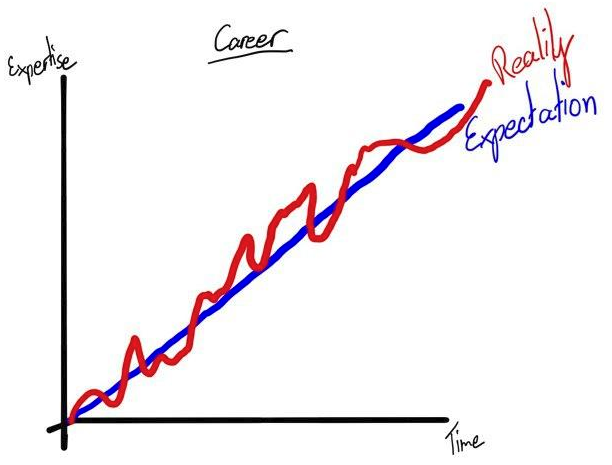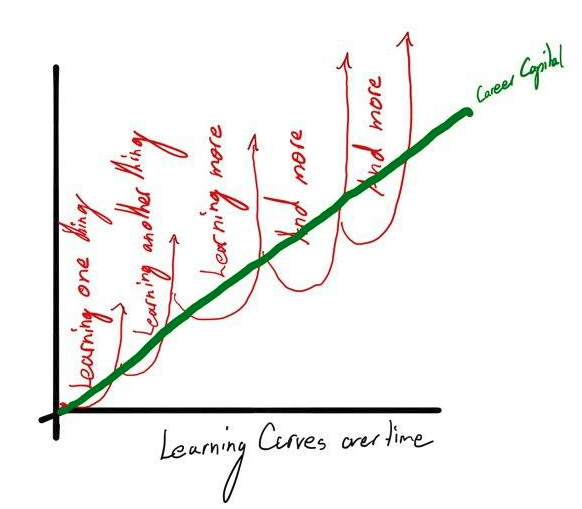Throughout the past months, I have put a lot of thought into "what I want to continue to do in my professional life" and "whether I was doing the right thing". One reoccurring advice that I was given is to "follow my passion". To me, this boils down to identifying a goal and aligning your actions to reach that goal.
In this post, I argue why choosing a professional career path is not as straight forward, and why following your passion might be the completely wrong approach. Instead, I am promoting the following:
- Build career capital
- Enhance your career through a series of small bets
- Leverage your career capital to gain control in your professional life
- Define your mission and market your work
If you are curious about learning more about my approach and how it helped me so far, please read on.
Follow your passion vs. build craftsmanship
At a very high level we can distinguish between two methodologies for building your career. One of them, which you might be all too familiar with, is the passion-based career. Summarizing, you identify what makes your eyes sparkle, your heart jump, and gives you ever lasting excitement. Once you know what this is, you build expertise around your passion. The idea is that you can only become really good in something if that's what gets you out of bed in the morning.
In comparison, by focusing on craftsmanship, you focus on building your expertise within a specific field. You focus on becoming really good at something to grow your knowledge, skill-set and ultimately, your influence. In the process, you start to enjoy your work more because you add value, people start to rely on you for your expertise, and you advance. Your skills, knowledge and expertise can be summarized as your career capital.
The Difference
The main difference is that the passion mindset looks at what the world can offer you vs. the craftsman mindset looks at what you can offer the world.
At the beginning this difference looks trivial – the approach of acquiring skills within an area that you are passionate about vs. an area that is aligned with your existing skills. However, in the long-term the impact on your work of following each respective approach becomes more visible.
If you follow your passion but your excitement is not met at your current job, you will easier fall into the trap of asking yourself whether it is the right job for you or if there is another team where you could have higher impact. You might end-up job hopping, or waiting for the moment, where your expectations are met, in a supportive environment that allows you to advance your skills. In short, external influence determine your level of growth, and maybe even the level of satisfaction in your career and happiness.
If you focus on a craftsmanship approach instead, you are taking control over external factors that have or could have an impact on your career. In this case, you are making small assumptions on the requirements that have to be met to achieve certain outcomes. You set goals and identify paths to work towards those goals. While you are working towards those milestones, you are building career capital.
Let's talk example
In his book "So Good They Can't Ignore You" Cal Newport provides several examples of people in various paths of life and situations, where they have chosen to follow either approach. The part that I identified the most with was the following:
"I have a ton of different interests, and I don't have focus," one of the students complains. Morris looks at her: "You'll never be sure. You don't want to be sure."
These interviews emphasize an important point: Compelling careers often have complex origins that reject the simple idea that all you have to do is to follow your passion. – Cal Newport
We are taught throughout school that we are meant to figure out what our passion is and follow that field. I wrote the following in my college application:
Information Systems provides the link between algorithmic programming languages, logical thinking and people. Looking forward, I see myself in project management, which combines those areas; I enjoy constantly challenging myself to develop the skills I need to be successful in this field. – 17 year old Anais
If you then realise that you do not know what that one thing that you are passionate about is, you might feel lost and disoriented.
When I was 13, I was assured I would want to become a heart or brain surgeon. Maybe a veterinarian. Those jobs, or what I believed those jobs would be like, excited me. Then I changed schools, had different teachers, and got interested in tech businesses. From there, my interests developed further into tech and now, since several years, I am working for tech start-ups. While I am building my expertise within the tech sector (I know, really broad), I am interested in multiple paths forward. One of them might be Systems Engineering, Security Engineering, Developer Relations, Front-end development etc. At the same time, I am interested in plants, psychology and healthcare.
Drawing Parallels
Your career path is not a straight line (and I am sure you heard this before but here is how it relates to the passion and craftsman mindset). Over a year ago, I had a junior software engineering position at a company that likely promised stability and steady career growth. However, before that I spent a year developing my understanding in the crypto/blockchain space.

Then, one day, my now teammate came along and asked me whether I would be interested in interviewing for a position at their blockchain startup. The job offered high risks and also high rewards. At the time, I wanted to start out in software development. However, staying with the company I was at meant that I was not able to build upon my blockchain understanding. In contrast, joining the startup meant I might not have a straight-forward career path into software-development.
I took on the role in the startup. Fast forward, while I was mainly doing community management for the past year, I learnt so much that I would never have been able to as a junior software developer in a 400+ people company. I might not have been able to develop specific engineering skills, but my career capital is likely higher than if I would have stayed with the other company.
Career Capital to Grow Control
People start gathering career capital before they know what they want to do. You build career capital through your school and volunteering work, through internships, jobs and self-education. Through consistently stretching your skills, challenging your abilities and receiving feedback. If you focus on the craftsman mindset, you will aim to maximise your learning experience. Even if your job does not seem to be impactful at the time, every step is an opportunity to develop your skills further.
Once you have sufficient career capital, for example, you are working in a position, where your co-workers are well aware of the value you add to projects, you can use that capital to gain further control of your life. This might be either in the form of promotions, or additional freedom in decision making in your private and professional life.
In contrast, if you do not have career capital it will be bold to make asks that are beyond the value you provide to others. In this case, people have little reason to support you in your interest, in your drive to make changes, and overall, to gain more control. Making your ask at the right time is highly valuable and will allow you to move faster.
- Do what makes you uncomfortable – growth is uncomfortable
- Work on gaining a continuous feedback stream
- Don't let anything distract you from your goal

Story Time
I dropped out of my first degree. This had several reasons – one of which was that I did not see how I would have a competitive advantage completing my degree program. Instead, the opportunity to work full-time while completing a different degree program through online self-studies seemed like it had better potential. In hindsight, I am really glad I made that decision. However, for the people around me it was and it is still not clear why I chose not to complete my degree first and "go the conventional route". (I was even told that I always do the exact opposite of what people advise me to do.)
Besides a nearly completed degree and several part-time work and internship experiences, I did not have much to show on my CV. I got my first job by submitting example work and working over-hours to deliver on expectations. The work excelled on my opportunity to build expertise within a specific field – and thus, laid the path for future work.
Focusing on what am I able to do right now with my existing skills, where do I want to improve and how can I make my next milestones happen, resulted in developing valuable skills and experience. This in turn, unlocked new career opportunities.
Define Your Mission And Market Your Work
Remember my comparison from above about your career not being a straight path? Similarly, your mission does not define your career capital but your career capital defines your mission.
When we follow the passion mindset, we start-out by looking for the the end goal, and then take actions towards that goal. This is usually quite a big leap to take (especially for teenagers making their University choice). In the case of adversary we often respond by questioning whether that goal is the right one and whether our environment is the best to work towards our goal.
In contrast, if we focus on the craftsman mindset, we are allowing ourselves to build expertise in a dynamic setting without constraining our experiences by the environment we envision to reach a specific goal. Once we have gained valuable understanding of a subject or research, we are far more likely to define a mission that is unique to us and our expertise.
Once you have the capital to identify a mission, you must still figure out how to put the mission into practice. If you don't have a trusted strategy for making this leap from idea to execution, then like me and so many others, you'll probably avoid the leap altogether. – Cal Newport
Instead of asking "what is your passion", we should be talking about what someone wants to learn next and why. A great mission should compel people who encounter it to remark it to others and overall, to find your mission worth supporting.
To some people, the entire process described throughout this post might come a lot more intuitive and natural. You might be currently marketing you mission, excelling at your work and acquiring new skills daily – or you might be stuck in the loop of finding what your passion is and would find a different perspective valuable.
There is a lot more that I would want to share on this topic but I will leave this for another post.
Thank you for reading!
If you would like to share your thoughts, please reach out either via email or twitter and subscribe to be the first to hear about new posts. I promise I won't spam you.
